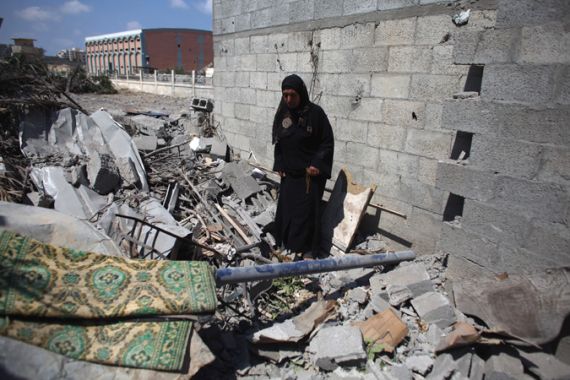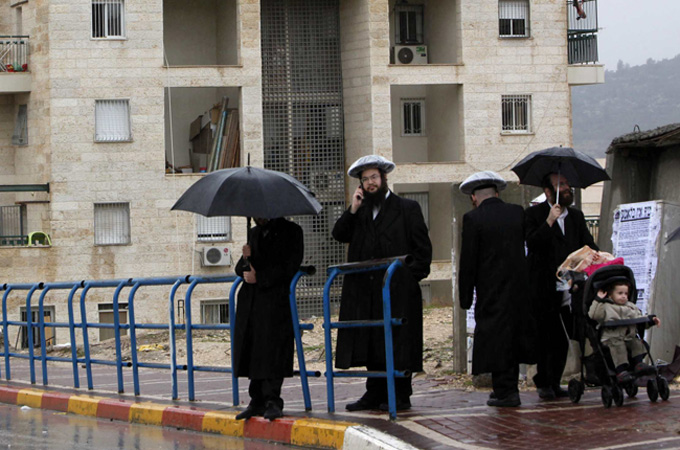Sacred women in Israel and Palestine
Will protests against ultra-Orthodox Jews’ campaign for gender segregation get justice for women in Israel, Palestine?

 |
| Ultra-Orthodox Israelis have become an increasingly powerful political force [Reuters] |
Irvine, California – I can think of about four million Palestinians who can sympathise with Naama Margolese, the eight-year-old Israeli girl, whose routine humiliation by ultra-Orthodox Israelis on her way to school has “shocked” the nation, uniting the majority of Jewish Israelis in anger at the growing power of harshly conservative Jewish movements in the country.
But you won’t be hearing from them any time soon the way this story is being presented.
Coming on the heels of the unprecedented and largely secular protests this past summer in Tel Aviv and other cities to press for affordable housing and “social justice” more broadly, and the recent attacks by extremist settlers against Israeli soldiers, this latest conflict has led many mainstream news outlets to talk of a continuing “religious war” in Israel, pitting secular and moderately religious Jews against an increasingly assertive, militant and expanding ultra-Orthodox sector.
“It doesn’t matter what I look like, someone should be able to walk around in sleeveless shirts and pants, and be able to walk down the street and not be harassed,” the young girl’s Chicago-born mother, Hadassa, explained.
Of course, Palestinians couldn’t agree more. But somehow, the vast majority of the Israeli and Western mainstream media seems unaware of the obviously parallels between the treatment of Naama Margolese and Israeli girls and women more broadly by ultra-Orthodox, and the treatment of millions of Palestinians by Israel. Even the most recent Haaretz editorial criticising the growing militarism and violence of the ultra-Orthodox did not mention Palestinians.
Unpleasant images
In fact, as unpleasant as are the images of a young Jewish girl being screamed and even spit at by Israeli Jewish Taliban, it is still preferable from the point of view of Israel’s propaganda efforts to being confronted with heartrending images of Jews attacking Palestinians, never mind religious settlers attacking of young Palestinian children, which is a routine occurrence in the Occupied Territories.
It is ironic that today Jewish-on-Jewish conflict is, from a certain perspective, preferable (at least at the level of spectacle) to Jewish-Palestinian conflict, because for several decades, part of the accepted wisdom surrounding the unwillingness of Israelis to reach a viable peace agreement with Palestinians was that doing so would lead to an untenable level of conflict, and even civil war, within Jewish Israeli society.
The alternative to focusing on this story would be a focus on Israeli High Court’s determination on Tuesday that Israel can continue to exploit Palestinian mines and other resources for the benefit of Israelis, even though this is a direct contravention of international law. Or to read an email about a young Palestinian boy, so frightened by Israeli soldiers who have given his family 10 minutes to get their belongings out of their house before it’s to be demolished that he stood, shivering outside, wetting his pants. The list goes on and on; all of it, tragically, far worse than the already deplorable hatred and discrimination that Naama has daily faced, just for being a girl.
Sacred women
The Italian philosopher Giorgio Agamben has described the figure of the “homo sacer“, or sacred man, who from ancient Rome to the Middle Ages, and again today, is considered completely outside the law and deprived of all rights of citizenship. He can therefore be killed with impunity, not merely by representatives of the state (the police or army, for example), but by anyone.
Jews and Roma during the Holocaust are the modern epitome of the homo sacer, as are, to a greater or lesser degree, all colonised people, including – and particularly, today, Palestinians, as the South African theorist Achille Mbembe has shown in his work on necropolitics as well as Irish human rights scholar John Reynolds.
But there is a specific manner in which what I would term the “femina sacra“, or sacred woman, is also a primary object of violence, whether in Israeli, Palestinian, Egyptian or most other societies for that matter. The much publicised recent army and police violence against women in Egypt is a good example of how, once the general public loses fear of state violence, the state must press even harder by specifically attacking the repository of honour and values – female citizens – as a way of attempting to break down the resistance of society as a whole. Of course, it rarely works, but equally and perhaps even more powerful is when in the public sphere men push with increasing force to exclude women.
And so, as I write this, a female Israeli soldier was accosted on a bus by an ultra-Orthodox man who called her both a prostitute and a “shiksa“, or non-Jewish woman. Her presence in his space automatically rendered her outside the bounds of the community. The link between such an attitude and those of Hamas, which began its existence a generation ago by throwing acid on women it considered to be dressed immodestly, are clear.
Too many Israelis still don’t understand this reality – although the ultra-Orthodox man who screamed “This is Iran” at a reporter in Beit Shemesh certainly does. Two male conductors, rushed to aid the young woman, yelled at the man: “‘Why are you shouting, she’s a soldier!” as if her defence of a state they don’t recognise outweighs the perceived crime of being a woman challenging their dominance of public space. It doesn’t, and their attitude reveals that a society whose identity is so deeply rooted in its exclusion of the Other will ultimately wind up at war with itself.
Israeli President Shimon Peres declared solemnly that Israelis are “fighting for the soul of the nation and the essence of the state”, while a member of the ultra-Orthodox Shas party declared that the harassment the young girl faces “have no place in sane and moderate Judaism”. Excluding women from the full rights of citizenship or the realisation of their humanity – at least as that humanity has come to be nearly universally accepted and codified in international law – is, as one sign held up by a female protester in Bet Shemesh against the ultra-Orthodox put it, “my red line”.
Israeli Prime Minister Binyamin Netanyahu declared: “Israel is a democratic, Western, liberal state… In a Western liberal democracy, public space is open and safe for all – men and women alike – and has no room for any harassment or discrimination.”
Neither western nor liberal
Of course, Netanyahu is lying. Israel is not democratic in any meaningful sense if one considers that millions of Palestinians under its control for decades have been deprived of citizenship and its attendant rights – a society in which anyway, from elderly man to young girl can become “sacred” – that is, outside the bounds of civilised law, at any moment. Nor is it Western in any meaningful sense in that it has honoured the core ideal of Western modernity largely in the breach (which, of course, only makes it a microcosm of the West writ large). And while gays might have rights – at least in Tel Aviv, for now – it cannot be considered liberal from any perspective when it so thoroughly violates the rights of millions of people.
But as long as Palestinians are absent from the conversation, as long as the focus is on Naama Margolese and the reprehensible conduct towards her, then the fiction that there is still a struggle to be had for Israel’s “soul” can be maintained.
Of course, for some adult ultra-Orthodox women in Beit Shemesh, being forced to the back of buses and being prevented from walking on the same side of the street as men or being attacked for not dressing modestly enough is not a problem. “I feel uncomfortable when men look at me,” one woman declared in explaining why she doesn’t mind being segregated away from men.
We can debate whether the woman who isn’t bothered by segregation or the back of the bus is making a free judgment, or has been so cowed by living in an extremely patriarchal and repressive community that she has internalised male dominance to the point of accepting it as both a given and a source of protection – just as so many Muslim women accept and even defend their second class status in countries across the region. But free adults at least have, in theory, a choice. Naama Margolese has clearly not been socialised into the values of this community, and feels frightened and excluded by what its members are trying to impose on her.
Recognising shared oppression
As her mother complained, “they” want to “push us out of” and “take over the city”.
This is, of course, a lament which untold numbers of Palestinians can appreciate, from residents of Jaffa pushed out to make way for expensive condominiums to Bedouins whose villages remain unrecognised when their lands aren’t being further expropriated to the millions of Palestinians across the Green Line and in exile.
If Israel is to have a chance at surviving as some approximation of the “Jewish democratic state” envisioned by its founders, Jewish Israelis, like Hadassa Margolese and the protesters on behalf of her daughter, or the J20 protesters this summer who took to the streets in huge numbers for “social justice”, are all going to have to accept that the injustices against which they are fighting are inseparable from the injustice their society as a whole continues to inflict, far more intensely, upon Palestinians.
I won’t get my hopes up for the adults accepting and acting upon this reality any time soon. But as she grows up, we can hope that Naama’s firsthand experience of exclusion, oppression, bigotry and even hatred, will help her see the equal humanity of the Israeli Other – Palestinians – more fully than her parent’s generation has been able to do.
If that can happen, then however unacceptable Naama Margolese’s experience, it will have prepared her for the even greater struggle for full democracy for all the people, men and women, Israelis and Palestinians, living between the River and the Sea, that will soon enough be her generation’s to assume.
Mark LeVine is a professor of history at UC Irvine and senior visiting researcher at the Centre for Middle Eastern Studies at Lund University in Sweden. His most recent books are Heavy Metal Islam (Random House) and Impossible Peace: Israel/Palestine Since 1989 (Zed Books).
Follow him on Twitter: @culturejamming
The views expressed in this article are the author’s own and do not necessarily reflect Al Jazeera’s editorial policy.
